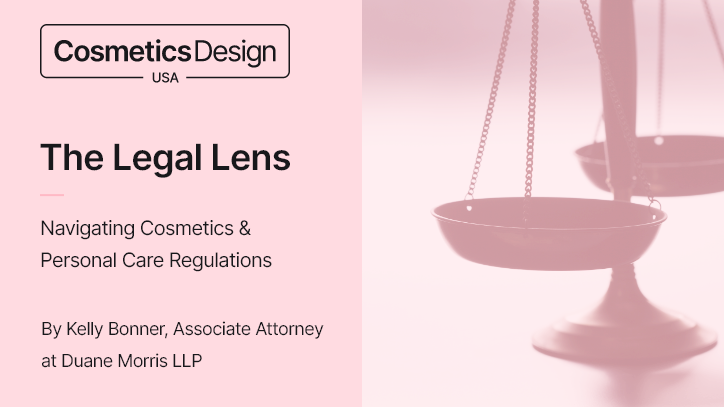
Welcome back to another edition of the Legal Lens, where we navigate all things legal and regulatory in the world of personal care products.
For those of you who are new, my name is Kelly, your friendly neighborhood lawyer—a title that probably won’t get me a tryout with the Avengers any time soon—and I’m here to demystify the legal side of the beauty world. Anything said here is intended to be entertaining and educational, and not intended as formal legal advice.
So where did we leave off?
Why do I keep hearing about MoCRA?
On December 23, 2022, Congress enacted the Modernization of Cosmetics Regulation Act (MoCRA)—the most significant statutory change to the U.S. federal government’s ability to regulate cosmetics since the federal Food, Drug, and Cosmetic Act in 1938.
Passed as part of the $1.7 trillion omnibus Consolidated Appropriations Act of 2023 and the Food and Drug Omnibus Reform Act, MoCRA significantly expands FDA rulemaking and enforcement over cosmetics and creates substantial new compliance obligations for manufacturers, packers, and distributors of cosmetics in the United States.
How so?
MoCRA contains a number of significant new or enhanced federal obligations with respect to cosmetics. For example, MoCRA now:
- Requires any facility that manufactures or processes cosmetic products intended for sale in the United States—whether or not the facility is located in the U.S.—to register with the FDA;
- Requires manufacturers, packers, and distributors of cosmetics intended for sale in the U.S. to list products and ingredient information;
- Imposes greater recordkeeping obligations for product safety and increased reporting obligations for serious adverse events—with an expanded definition of what constitutes a .serious adverse event; and
- Imposes new labeling requirements, including providing contact information for adverse event reporting, and notifications for products intended for professional use.
Is that it?
No. FDA has been granted significant enforcement authority over cosmetics. Under MoCRA, FDA may take the following steps to address potentially adulterated or misbranded cosmetics:
- FDA can mandate a recall if it determines that (1) there is a reasonable probability that cosmetics are adulterated or misbranded and (2) exposure will cause serious adverse health consequences.
- FDA may suspend a facility’s registration if the FDA (1) determines that a product manufactured or processed at that facility has a “reasonable probability of causing serious adverse health consequences to humans” and (2) reasonably believes that other products manufactured or processed by the facility may be similarly affected.
- FDA may access certain records pertaining to product safety and request a list of ingredients in the fragrances or flavors in a product if it has reason to believe that a fragrance or flavor contributed to a serious adverse event.
Anything else?
Yes―MoCRA requires FDA to enact new regulations addressing:
- Good manufacturing practices,
- Fragrance allergens that must be disclosed on cosmetics labels, in line with EU and other international requirements, and
- Standardized testing methods for detecting and identifying asbestos in talc-containing products.
Additionally, FDA is required to issue a report within three years assessing the use of per- and polyfluoroalkyl substances, aka PFAS, in cosmetics and their safety.
MoCRA has imposed various timelines for FDA to issue these proposed rules and final rules by December 29, 2025.
Where can I learn more about MoCRA?
FDA maintains a webpage devoted to unpacking the background behind MoCRA, the meaning of key terms such as “responsible person” and “serious adverse event,” exemptions for certain small businesses (and exemptions to those exemptions), and links to webinars and FDA guidance (both draft and final) and materials from public listening sessions.
When does MoCRA go into effect?
MoCRA contains a number of staggered deadlines into 2025. But it’s important to remember that many of the key provisions of MoCRA have already come into effect, such as:
- Facility registration
- Product listing
- Safety substantiation
- Adverse event recordkeeping
- Serious adverse event reporting
- Labeling changes for professional-use cosmetics
- Enhanced FDA enforcement authority (e.g., inspection, mandatory recall, facility suspension)
What doesn’t MoCRA change?
A fair amount. For example, MoCRA doesn’t ban ingredients or restrict or prohibit animal testing. MoCRA also doesn’t prevent states from prohibiting or restricting use of certain cosmetic ingredients.
MoCRA also doesn’t alter the existing regulatory framework with respect to products that contain CBD, or that contain active pharmaceutical ingredients, and may be regulated as “drugs.”
Finally, MoCRA doesn’t alter the existing regulatory framework governing what kind of promotional and marketing claims cosmetics can make, or define terms like “natural,” “clean,” “nontoxic,” “gentle,” or so-called green claims.
What can we expect in 2025?
MoCRA has fundamentally shifted how cosmetics are regulated in the United States, creating substantial new obligations for companies while expanding FDA’s authority. Companies should be prepared for additional requirements, rulemaking, updates, and guidance as MoCRA continues its rollout into 2025.
Until next month,
Kelly
Questions or suggestions? Reach out to contact Kelly at xnobaare@qhnarzbeevf.pbz.

